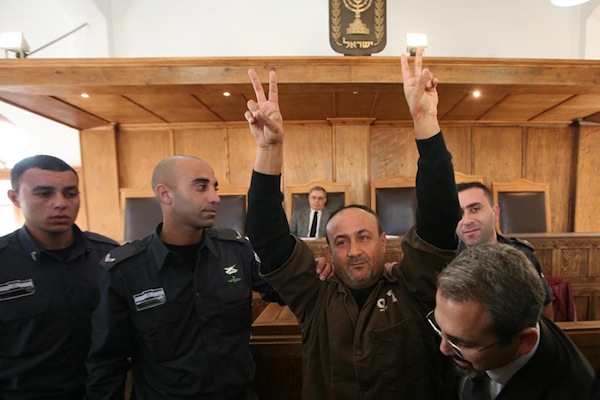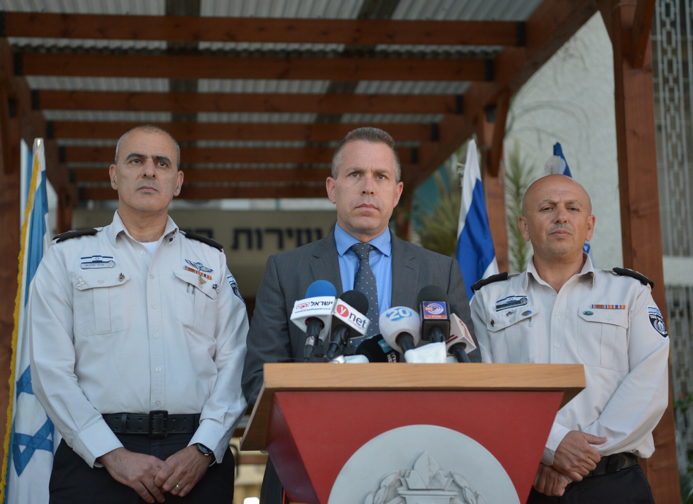The Israeli public doesn’t care about Palestinians on hunger strike, about conditions in prison, or what happens to a body after it is deprived of food for so long.

Sometime in the ’90s, “Popolitica,” a popular political talk show in Israel, brought on a woman from Israel’s geographical periphery who could not send her child to school because she could not afford it. “There is a law in this country that mandates all parents send their children to school!” she said angrily. Tommy Lapid, the late father of Yair Lapid, who sat on the panel, cut her off: “My dear, the money you spent on your haircut could have been used to educate your child for a year.”
I recalled this story after watching Public Security Minister Gilad Erdan and his doppelgängers celebrate the release of the video showing Palestinian prisoner Marwan Barghouti eating a chocolate-coated waffle while on hunger strike. How low does one need to go to bait a hunger-striking prisoner and then celebrate it as a victory? But this is the way of the villains: to scorn a woman who cannot send her son to school over her hair color, in order to avoid a serious discussion about a system that leaves out her son, or to celebrate images of a prisoner eating during a hunger strike, instead of talking about the demands and conditions in which thousands of Palestinian prisoners find themselves.

In fact, until this moment I didn’t see a single media outlet, aside from Local Call, publish the hunger strikers’ full list of demands. Why have 1,600 prisoners refused to eat for 3 weeks? What do they want? Who are these people? The Israeli public doesn’t know. It doesn’t know what their conditions are in prison, or how much harsher conditions have become for them since they started their strike. Prisoners are prevented from meeting with their lawyers and are subject to solitary confinement, raids on their cells at all hours of the day, invasive body searches, confiscating salt, which forms the core basis of hunger strikers’ diet during their strike. The Israeli public neither knows nor has any desire to know.
After three weeks of hunger strike, the Israeli public neither knows nor wants to know what happens to a body after it is deprived of food for so long. How the hunger striker struggles to stand on his feet, suffers from severe dizziness, a dramatic decrease in heart activity, fatigue, tremors, and potential damage to his lungs and motor skills. As the days go by, prisoners will have a difficult time swallowing water and may lose their sight, their ability to hear, and will have a difficult time breathing. And all this without going into the psychological consequences. But the Israeli public neither knows nor wants to know.
The Israeli public neither knows nor wants to know about the enormous significance this strike has for the Palestinian people on the outside; about the solidarity protests and tent encampments erected in support in nearly every city across the West Bank; about the people who joined the hunger strike in solidarity with the prisoners; about the hopes among the hunger strikers that this will move forward an internal dialogue between Fatah and Hamas. It does not know about the “Saltwater Challenge,” in which Palestinians around the world film themselves drinking a cup of saltwater in solidarity with the prisoners. It neither knows nor wants to know.
What is the Israeli public interested in, instead? Marwan Barghouti’s chocolate-coated waffle.
How did we stoop so low? How did we become such a lowly people that celebrates after a person whose body is close to giving in after prolonged starvation stuffs a few crumbs into his mouth. The nation that goes out and barbecues outside a prison so that the smell of the meat reaches the nostrils of the hunger strikers? When did we turn into such repulsive people? When did we willingly choose ignorance, blindness, and deafness — to become such a stupid collective? In what way does this serve us? And why do the vast majority of media outlets play along? What kind of story will we tell ourselves after the Barghouti tabloid stories disappear, and the first hunger strikers begin to collapse — or perhaps are even sent to some field hospital where they will be force-fed by doctors brought in from abroad — yet another one of Erdan’s twisted ideas.
Paradoxically, as the Israeli public chooses stupidity and refuses to open its eyes and look at the other side, and as the regime manipulatively takes away its power to do so, it loses its ability to deal with the conflict, thus increasing the acute need for international intervention. When hundreds of humans bring themselves to the brink inside prison as the only act of protest left at their disposal, while others blow smoke in their face from the other side of the wall, it becomes clear that the latter have lost all sense of pragmatism or moral right to write the rules of the game.
This post was originally published in Hebrew on Local Call.

